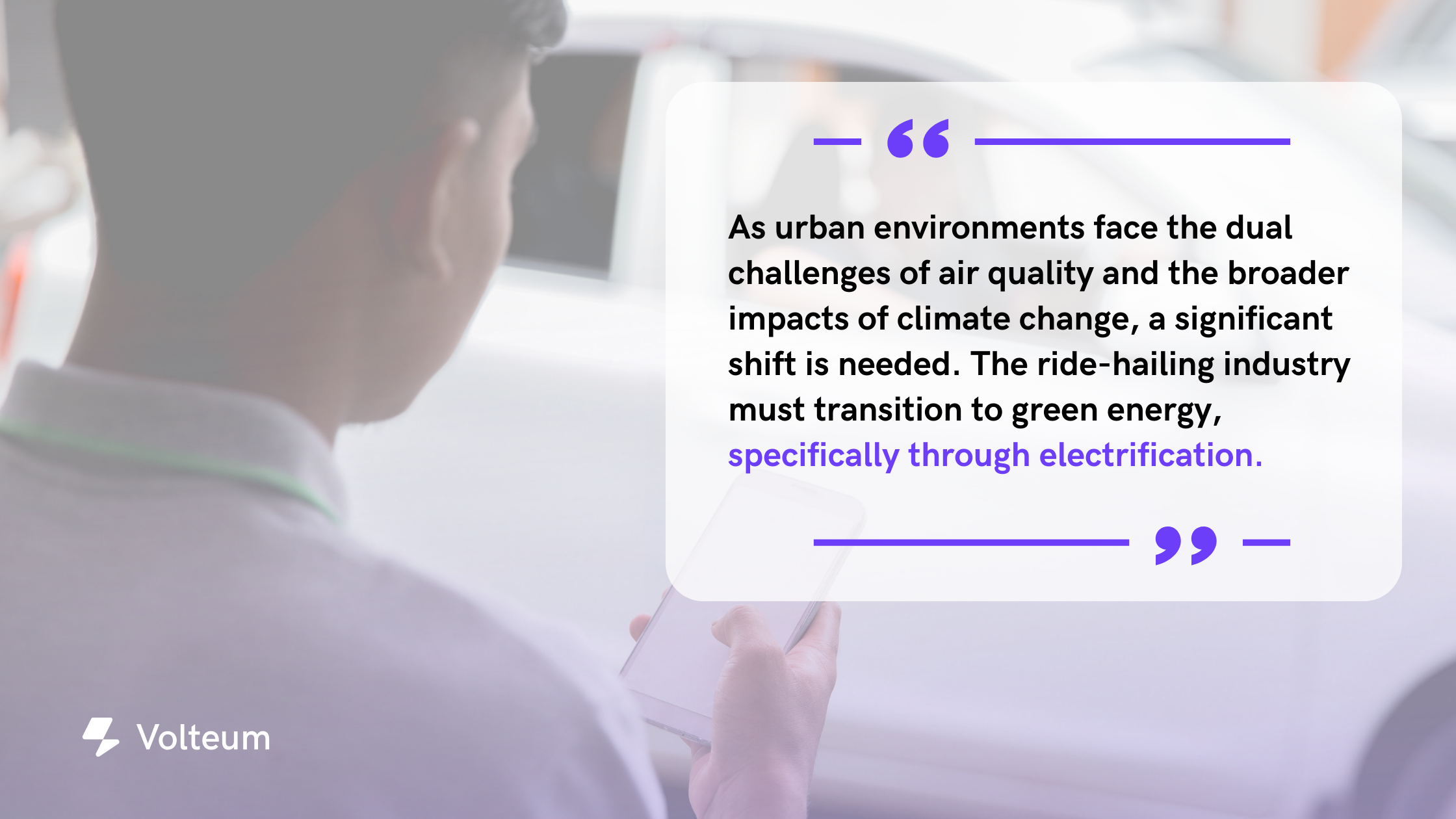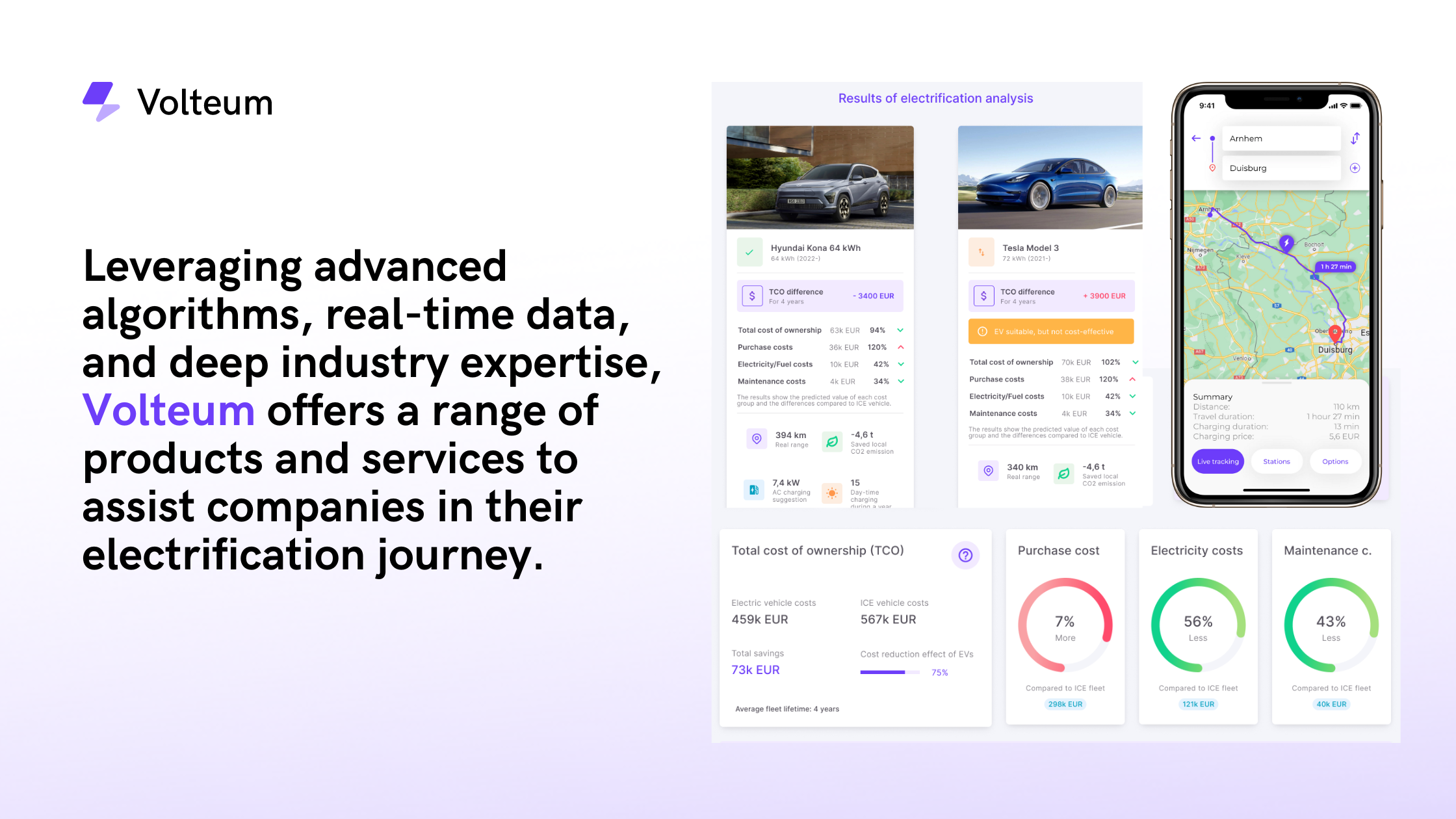Electrifying the ride-hailing industry: The state in 2023
Oct 30, 2023 · 6 min read · blog
Ride-hailing services have truly shaken up how we view commuting. It's become as simple as picking up our phone, pressing a few buttons, and waiting for our ride to arrive. However, as urban environments face the dual challenges of air quality and the broader impacts of climate change, a significant shift is needed. The ride-hailing industry must transition to green energy, specifically through electrification.

Why electrify ride-hailing?

- Environmental impact: Traditional vehicles, especially those that run on gasoline, are significant contributors to greenhouse gas emissions. Since ride-hailing vehicles tend to be on the road more frequently than private cars, their cumulative emissions can be substantial. Electrifying these vehicles can drastically reduce the carbon footprint of each ride.
- Economic benefits: Electric vehicles have fewer moving parts than internal combustion engine vehicles, leading to reduced maintenance costs. Furthermore, with the falling price of batteries and increasing availability of charging infrastructure, the total cost of ownership for EVs is becoming increasingly competitive.

Current trends in electrification

Several ride-hailing giants are pushing the boundaries with their pledges:
- Uber: Uber has committed to ensuring 100% of its rides will take place in EVs by 2030 in the US, Canada, and Europe.
- Lyft: Setting a benchmark, Lyft aims to operate a fully electric fleet by 2030.
- Bolt: European ride-hailing giant Bolt has made strides towards green transportation by introducing "Green Plan" in 2020. The company's goal is to reduce its ecological footprint by offsetting its carbon emissions and investing in sustainability projects. It aims to have more than half of its rides in electric vehicles by 2025.
- Didi Chuxing: Often referred to as the "Uber of China", Didi has expressed intentions to operate over a million electric vehicles on its platform by the end of 2022.
- Ola: India's ride-hailing major Ola has been steering towards electrification with Ola Electric – its EV arm. The company has been vocal about its ambitions to promote electric mobility in India and aims to bring a million electric vehicles on Indian roads by 2022.
- Grab: Southeast Asia's ride-hailing behemoth, Grab, has set its sights on electrification by partnering with various automakers and energy companies. They announced an ambition to make every car on its platform electric by 2030.


Source: latamobility.com

Challenges ahead

Vehicle costs:
- The upfront investment for EVs is higher than conventional vehicles.
- While the costs are expected to decline, they remain a significant barrier, especially for individual drivers.
Infrastructure gaps:
- Adequate charging infrastructure is pivotal for large-scale EV adoption.
- Currently, there's a mismatch between EV growth and the growth of charging facilities in many regions.
Range anxiety:
- The fear of running out of battery before reaching a charging station is real, especially in areas where charging points are sparse.
- Advances in battery technology and more rapid charging solutions are needed.
Governmental support:
- Financial incentives, tax breaks, and grants can play a crucial role in accelerating the transition.
- However, policies vary widely across countries and even within states or provinces, leading to a fragmented landscape.
Public perception:
- Despite the surge in EV popularity, many still hold reservations about EVs' reliability, longevity, and overall feasibility for daily use.
- Education and awareness campaigns, coupled with real-world testimonials, can help in changing these perceptions.



Driving forward

As the push for electrification in the ride-hailing industry gains momentum, innovative solutions are being brought to the forefront to combat the prevalent challenges.

Shared charging networks:
- The concept: Fostering collaboration between ride-hailing platforms, city administrations, and charging network providers can lead to the creation of dedicated charging hubs.
- Benefits: These hubs can offer faster charging speeds, reserved spots, reduced wait times, and potentially lower charging fees, ensuring drivers remain operational for longer durations.
- Potential outcome: Such collaborative initiatives can stimulate local economies, driving traffic to nearby businesses.

Financial incentives:
- Immediate impact: Direct financial interventions, like subsidies or rebates, motivate ride-hail drivers to transition to EVs, easing the initial investment burden.
- Long-term implications: Highlighting the long-term economic benefits, from decreased operational costs to maintenance savings, makes a compelling case for EV adoption.
- Role of stakeholders: Both local and national governments, in partnership with ride-hailing platforms, can significantly influence the implementation of these incentives.

Awareness and training programs:
- Tackling misconceptions: Addressing prevalent myths about battery lifespan, charging durations, and vehicle upkeep can promote informed decisions.
- Hands-on training: Interactive sessions that introduce drivers to EV operations, charging procedures, and troubleshooting can facilitate a smooth transition.
- Economic and environmental insights: Emphasizing the environmental positives and potential savings can serve as a strong motivation.

Infrastructure expansion and optimization:
- Localized charging solutions: In areas with high ride-hailing traffic, the establishment of dedicated EV charging zones can ease accessibility concerns.
- Smart charging systems: Implementing technology that schedules charging during off-peak hours can further reduce costs and grid congestion.

Policy and regulatory support:
- Zoning regulations: Cities can introduce special zones where only electric ride-hailing vehicles operate, pushing companies towards faster electrification.
- Partnerships with manufacturers: Governments can facilitate partnerships between vehicle manufacturers and ride-hailing platforms to design EVs tailored to the specific needs of the industry.



Riding the wave ahead with Volteum

Electrifying the ride-hailing industry presents an array of challenges, but with every challenge comes an opportunity. From infrastructure to driver adoption, strategic and insightful planning is paramount.
Here at Volteum, we are equipped to support ride-hailing businesses in this transformative journey. We offer specialized tools tailored for both the initiation of electric vehicle adoption and the optimization of their daily operations. As the world shifts towards a sustainable future, our objective is to ensure ride-hailing platforms have the best resources at their disposal.
In short, the road to a greener ride-hailing future is paved with innovation and collaboration. At Volteum, we're proud to be part of this vital transition, offering the insights and tools necessary for success.